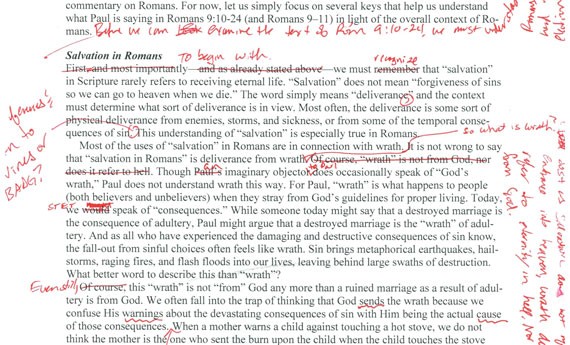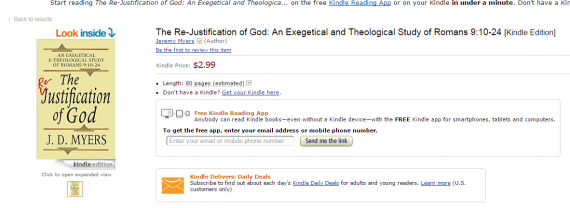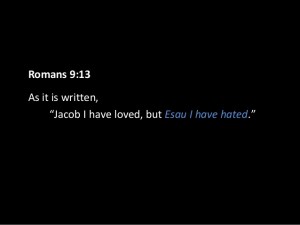 Paul writes a difficult statement in Romans 9:13:
Paul writes a difficult statement in Romans 9:13:
Jacob I have loved, but Esau I have hated.
Scholars debate whether or not God actually hated Esau. There are two main opinions on this question.
Option 1: Hate = “Love Less”
Some argue that the reference to hate in Malachi 1:2-3 is a Hebrew idiom for “love less.” They point out that Jesus instructs us to love our enemies rather than hate them (Matt 5:44), point to the places where Jesus tells His disciples to both hate and love their parents (Luke 14:26; Mark 10:19), and remind people that God has strictly forbidden the Israelites from hating the Edomites (Deut 23:7).
Greg Boyd succinctly explains this idea:
Some might suppose that God’s pronouncement that he “loved” Jacob and “hated” Esau shows that he is speaking about their individual eternal destinies, but this is mistaken. In Hebraic thought, when “love” and “hate” are contrasted they usually are meant hyperbolically. The expression simply means to strongly prefer one person or thing over another.
So, for example, when Jesus said, “Whoever comes to me and does not hate father and mother, wife and children, brothers and sisters, yes, and even life itself, cannot be my disciple” (Lk 14:26), he was not saying we should literally hate these people. Elsewhere he taught people to love and respect their parents, as the Old Testament also taught (Mk 10:19). Indeed, he commanded us to love even our enemies (Mt 5:44)! What Jesus was saying was that he must be preferred above parents, spouses, children, siblings and even life itself. The meaning of Malachi’s phrase, then, is simply that God preferred Israel over Edom to be the people he wanted to work with to reach out to the world (See “How do you respond to Romans 9?“)
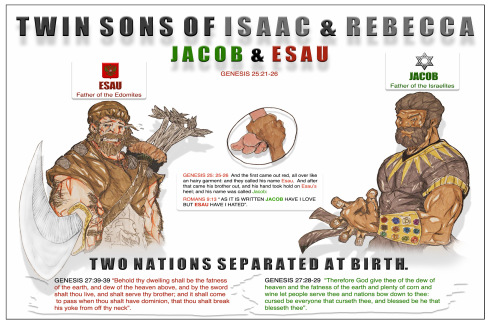
Option 2: Hate = Hate
Others, however, argue that God did in fact hate Esau (and the Edomites), for that is what the text clearly states. The Calvinistic commentator John Murray provides a good explanation of this view:
We must, therefore, recognize that there is in God a holy hate that cannot be defined in terms of not loving or loving less. Furthermore, we may not tone down the reality of intensity of this hate by speaking of it as “anthropopathic” … The case is rather, as in all virtue, that this holy hate in us is patterned after holy hate in God (Murray, Romans, 2:22).
So which view is right? Did God hate Esau?
 How can we choose between the two views above? Does God hate Esau and Edom, or does He simply love Edom less than He loves Israel?
How can we choose between the two views above? Does God hate Esau and Edom, or does He simply love Edom less than He loves Israel?
The solution to the problem of Romans 9:13 is to agree with those who say that “hate” means “hate,” but to also agree with the others who argue that neither Paul nor Malachi are talking about Esau’s eternal destiny (or anyone else for that matter).
More critical still is to recognize that what God hated is not specifically Esau, for Malachi 1:3 was written many centuries after he had died, nor was God saying He hates the people of Edom.
Instead, God hated how Edom behaved toward Israel.
The Hebrew word used in Malachi 1:3 for “hate” (Heb., sanati) is used in various other places to speak of hatred for the sin and wickedness of people (cf. Psa 26:5; 101:3; 119:104, 128, 163; Prov 8:13; Jer 44:3; Amos 5:21; 6:8; Zech 8:17), not hatred for the people themselves. In light of what many other biblical prophets say about the actions and behavior of Edom (cf. Jer 49:7-22; Lam 4:21-22; Ezek 25:12-14; Amos 1:6-11), this is how we can understand God’s hatred in Malachi 1:3.
God does not hate Edom; He hates how she has behaved. Specifically, God hated how Edom treated Israel.
To read more about this, check out my new book: The Re-Justification of God.
If you want to read more about Calvinism, check out other posts in this blog series: Words of Calvinism and the Word of God.

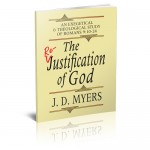


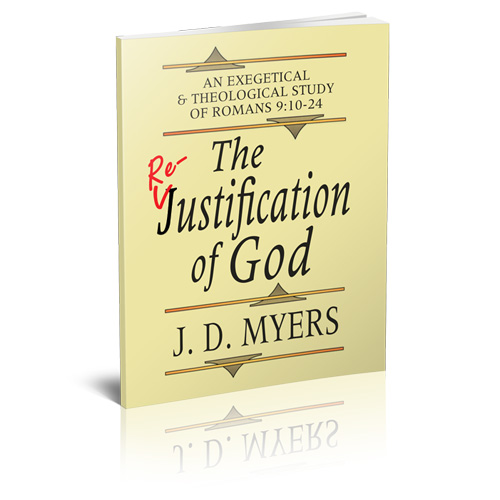
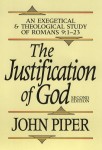 It is probably the ugliest book cover I have ever designed, but if you compare it with the cover from John Piper’s book on the right, you’ll see why I created the cover as I did.
It is probably the ugliest book cover I have ever designed, but if you compare it with the cover from John Piper’s book on the right, you’ll see why I created the cover as I did.